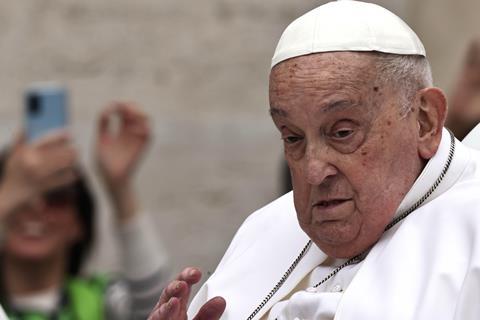The world mourns as Pope Francis, the first Latin American pontiff dies after 12 years in the Vatican, aged, 88. Emily Nelson shares her tribute to the 266th Pope of the Roman Catholic Church.

Vatican City. 20th Apr, 2025. POPE FRANCIS on the blessing’s balcon during the Easter blessing Urbi et Orbis. (Credit Image: © Evandro Inetti/ZUMA Press Wire)
Even in an increasingly secularising world, the pope impacts. As the leader of our Church, for Catholics he is a symbol of the faith that unites us, an important connection to Christ through his role, authority and lineage and a representative throughout the world.
Due to his position and fame, popes can exact change beyond their religious sphere of influence: something Pope Francis was proven to be particularly successful in. Catholics believe God calls every pope to be elected for a particular reason to bring something important for their time, and Pope Francis will be remembered for all he brought.
READ MORE: ‘I have been praying the rosary in Rome for the Pope’s recovery and I will continue to pray for him as I play Mary Magdalene at The Passion of Jesus in Trafalgar square this Easter’
We all know of him as pope. Prior to his election, Pope Francis was known as Cardinal Jorge Mario Bergoglio. He was born in Buenos Aires, capital of Argentina, to an immigrant father and Argentinian mother. Many people are not aware that he worked as a bouncer and janitor then graduated with a chemical technician’s diploma and employed this knowledge working in a laboratory. Aged 21, he had severe pneumonia and part of his lung removed. After several years, he was inspired by another priest to join the seminary, leaving his job and the opportunities that came with it.
I was in Buenos Aires last July and visited the Cathedral Pope Francis served in as Archbishop. The high regard they retained for him was clear upon entry with a colourful noticeboard dedicated to his ministry and a video on loop of him saying Mass at the Cathedral, demonstrating the pride of locals and his significance in his own city.
The impact of Pope Francis has not gone unrecognised
The impact of Pope Francis has not gone unrecognised. Social scientists have a special term for this: the ‘Francis effect’. This is particularly unusual for a pope and the number of studies on this subject demonstrates the reach he had. Through publications like Laudato Si’ he has been proven to effect climate change concern and the view that global climate change constitutes a moral issue. Through his work and particularly his use of X (previously ‘Twitter’) he was demonstrated to influence individual religiosity and trust in the pope and engage followers in methods to respond to crises as they arise.
Though I was brought up as a Catholic, I later came to reject it.
Though I was brought up as a Catholic, I later came to reject it. Through conversations, which led to answered questions and then further research and reading I came back to faith and found confidence in Catholicism. Pope Francis said a parish should be a “community of communities” and out-ward looking. It was through such a welcoming community that I came to back to the Church.
READ MORE: ‘The Pope has condemned surrogacy - but I believe it deserves a second chance’
At World Youth Day, an international Catholic festival, in 2015 and 2019 I had the privilege of hearing Pope Francis say Mass: which Catholics consider the source and summit of our faith. He spoke in a way that felt caring and personal. I also attended the 2018 World Meeting of families held in Dublin. There he shared transparently and meaningfully on the impact of Church abuses particularly in Ireland. He did not cower from this difficult subject but addressed and met with victims directly to bring healing.
Every pope has particular qualities that resonate with some more than others, but in my view Pope Francis used tools at his arsenal to effectively reach out and make a proven impact across the world. He has influenced through his commitment to those in need, mercy, focus on the need for interreligious communication and dialogue and humility (represented in his namesake: Saint Francis of Assisi, known for giving up all of his riches). During his recent illness, a priest shared with me how he touched he was by the number of people, particularly non-Catholics who reached out to say that they were praying for Pope Francis.
READ MORE: Ethan Hawke believes the Pope can end the war in Ukraine… and it’s not as wild as it sounds
Clearly the pope is important to all Catholics, and Pope Francis is known in particular for a deep commitment to mercy, humility and focus on serving the poor and marginalised. His leadership inspired a range of responses, but the focus of his message to live out the Gospel with humility and compassion remains a call that speaks to the heart of the Church’s mission: to be a source of hope and grace for all, rooted in the love of Christ. Amongst other examples, his almost daily contact with a Church in Gaza in need and his ministering to those in prison including washing their feet has challenged me in how I can better respond to those in need. The Catholic Church (rightfully in many cases) has shamefully faced a lot of criticism. As a Catholic, this has been very difficult, but Pope Francis and his public image have helped to alleviate this, and that means a lot to me personally in my desire to share all the good it has done for me and has to offer others.
In this Jubilee Year, he called Christians “Pilgrims of Hope,” urging us to be agents of hope within our families, friends, and communities. In our reaction to his recent passing, this can be a focus to move forward in Christ’s love.
































No comments yet